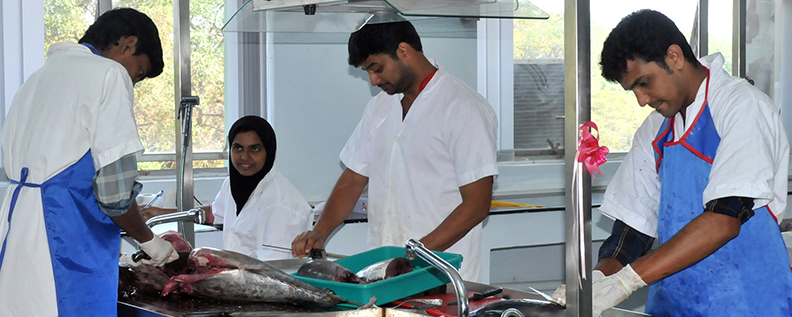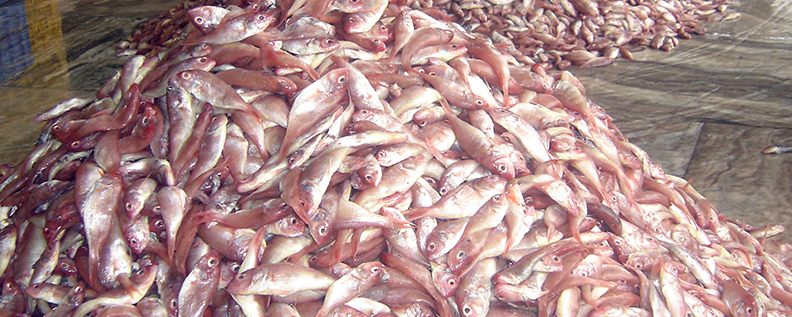- Thrust Areas of Research
-
Major Achievements
- Database on resource composition of finfishes landed along the Indian coast by different gears on spatio-temporal platform.
- Database on biology, including length distribution, reproductive and feeding characteristics of prioritized species.
- Spatio-temporal distribution and abundance of fish eggs and larvae along the Indian coast being documented.
- Live bait abundance and spawning sites along Lakshadweep Islands identified and mapped.
- Fishery forecasting protocols for Indian oil sardine along the south-eastern Arabian seas developed
- Impact of MLS enforcement along the Kerala coast assessed and report to Government of Kerala with relevant advisories
- Stock status of major exploited species harvested along the Indian coast estimated and “Marine fish stock status of India, 2022” with advisories for sustainable harvest proposed.
- Non-Detriment Findings (NDF) of the following CITES listed species i. Mako sharks - Isurus spp., ii. Bowmouth guitar fish - Rhina ancylostomas, iii. Devil rays - Mobula spp. and iv. Wedge & Guitarfishes Rhynchobatus spp. & Glaucostegus spp. published.
- Documentation of new information on several deep sea fishes and elasmobranchs from exploratory deep-sea surveys on FORV Sagar Sampada
-
Technology or Concepts Developed
- Three new finfish species identified and one species was resurrected from Indian waters with detailed comparative taxonomic and phylogenetic descriptions.
- Ageing protocols for tropical teleost fishes using hard parts standardized. It can be used for precise understanding of their biology and ecology of the species.
- Ornaments using otoliths designed and popularized, and which has large potential in the jewel industries.
-
Ongoing Research Projects
SI.No. Project Code Project Title Principal Investigator Project Period 1 FFD/ELM/07 Decoding the interplay of fisheries-dependent and fisheries-independent factors on elasmobranchs of India to improve conservation, sustainability, livelihood security and management Dr. Shoba Joe Kizhakudan 2024-2029 2 FFD/LPF/08 Development of Integrated Scientific Management Approaches for Biological and Livelihood Sustainability of fishery of tuna and tuna-like fishes along the Indian coast Dr. E.M. Abdusammad 2024-2029 3 FFD/IAF/09 Science for Sustainability: Developing an Integrated Assessment Framework (IAF) to support management decisions for marine fisheries in Kerala & Lakshadweep Dr. T.M. Najmudeen 2024-2029 4 FFD/IAF/10 Science for Sustainability: Developing an Integrated Assessment Framework (IAF) to support management decisions for marine fisheries in Karnataka & Goa Dr. Sujitha Thomas 2024-2029 5 FFD/IAF/11 Science for Sustainability: Developing an Integrated Assessment Framework (IAF) to support management decisions for marine fisheries in Andhra Pradesh Dr. Muktha M. 2024-2029 6 FFD/ENCFR/33 Exploring Non-Conventional Fisheries Resources: Assessing their Fishery, Stock Status and Potential for commercial exploitation Dr. Livi Wilson 2024-2029 -
Scientific Staff
No Name Designation 1 Dr. Shoba Joe Kizhakudan Principal Scientist & Head, FFD 2 Dr. A. Margaret Muthu Rathinam Principal Scientist 3 Dr. Sujitha Thomas Principal Scientist & Head, Mangalore RC 4 Dr. U. Ganga Principal Scientist 5 Dr. T. M. Najmudeen Principal Scientist 6 Dr. Rajesh K. M. Principal Scientist 7 Dr. Purushottama G. B. Senior Scientist 8 Dr. K. Mohammed Koya (on deputation as FDC, MoFAHD) Senior Scientist 9 Dr. Anulekshmi Chellappan Senior Scientist & SIC, Calicut RS 10 Dr. Muktha M. Senior Scientist 11 Dr. Swatipriyanka Sen Dash Senior Scientist 12 Dr. Manas H. M. Senior Scientist 13 Dr. Akhilesh K. V. Senior Scientist 14 Dr. Surya S. Senior Scientist 15 Dr. Subal Kumar Roul Senior Scientist & SIC, Digha RS 16 Shri. Nakhawa Ajay Dayaram Scientist & SIC , Mumbai RS 17 Dr. Remya L. Scientist 18 Dr. Livi Wilson Scientist 19 Dr. Mahesh V. Scientist 20 Smt. Shikha Rahangdale Scientist 21 Mrs. Vidhya V Scientist 22 Dr. Abdul Azeez P. Scientist 23 Dr. K. R. Veera Venthan Scientist 24 Dr. Gladston Y. Scientist
Explore CMFRI
- About Us
- What We Do
- Our Locations
- Knowledge Centres
- Others











